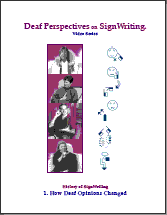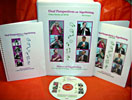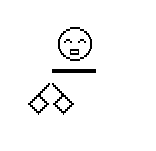About
This Video
Deaf
Perspectives on SignWriting Videos Series
Two videos and two colorful booklets. Available
on DVD.
ISBN: 0-914336-71-1.
Video
1: How
Deaf Opinions Changed
Deaf signers, native to American
Sign Language (ASL), give their opinions on SignWriting,
including Lucinda O'Grady Batch, Bonita Ewan, Kathleen
Say and Denny Voreck. In the early 1990's, the Deaf
Action Committee for SignWriting met in the evenings,
in Valerie Sutton's home, in La Jolla, California,
to discuss how to write signs and create documents
and dictionaries in American Sign Language. This
casual video was shot during one of those meetings.
The video finishes with Valerie telling about her
early days writing Danish Sign Language in Copenhagen.
Video
2: How SignWriting Changed
Taken from
the perspective of the Deaf people involved, Video
2 is a synopsis of how SignWriting changed and improved,
as more Deaf people began to write their language.
Native signers skilled in SignWriting discuss how
they used the system in the 1980's and early 1990's.
This 30 minute video features George 'Butch' Zein,
Lucinda O'Grady Batch, Kevin Clark, Denny Voreck,
and Valerie Sutton, with guest appearances by Deaf
actor Bernard Bragg, and a special visitor from
Saudi Arabia, Abdul Aziz Al-Obaid, who discusses
recording Saudi Arabian Sign Language. In American
Sign Language, with English voice and captions.
|
Credits
Deaf Perspectives on SignWriting®
Video Series: History of SignWriting
1. How Deaf Opinions Changed
Published by the DAC
The Deaf Action Committee For SignWriting®
Sponsored by
The Center For Sutton Movement Writing, Inc.
A non-profit, tax-exempt 501 c 3 educational organization.
P.O. Box 517 • La Jolla • CA. •
92038-0517 • USA
tel 858-456-0098 • fax 858-456-0020
DAC@SignWriting.org
Lessons Online......SignWritingSite: www.SignWriting.org
Dictionary Online......SignBankSite: www.SignBank.org
Deaf Perspectives on SignWriting®
Video Series
ISBN: 0-914336-71-1
Copyright © 1994, 1995, 1997, 1998
Center for Sutton Movement Writing, Inc.
Cover & Title Page Photos: Lucinda O'Grady Batch,
Bonita Ewan, Denny Voreck and Kathleen Say
All photos are captured from the video.
Voice-Over
by Melissa Smith
Book layout & design
by Valerie Sutton
SignWriting¨ was first invented
by Valerie Sutton in 1974.
Video Production Facility:
Lightning Corporation in San Diego, California
On-line Editor:
Thomas Kihneman
SignWriting¨ could not continue without support
from our sponsors, including...Hoag Foundation, Hughes
Give-Once Clubs, R.C. Baker Foundation, Rockwell Donate-Once-Clubs,
San Diego Gas & Electric, the Seuss Foundation,
TRW-Echo, and others.
SignWriter¨, SignWriting¨ & SignSymbolSequence®
are trademarks of The Center for Sutton Movement Writing.
SignWriting is a part of Sutton Movement Writing.
featuring...
Lucinda O'Grady Batch
Bonita Ewan
Denny Voreck
Kathleen Say
and...
Valerie Sutton
|
Transcript
Lucinda O'Grady Batch
"It is important to have a way to preserve
old ASL signs, as well as more current ones"
Cindy
Hi. My name is Lucinda O'Grady Batch (Cindy). I
am Deaf. I come from a Deaf family. I went to a
Deaf school in New Jersey. When I came to California
I got a job working at Salk Institute which focuses
on sign language research. I also have taught American
Sign Language (ASL) classes and I have been involved
in the field of ASL in general.
Now, let me explain a little about the DAC, which
stands for the Deaf Action Committee. That started
in about 1988. Valerie Sutton is a hearing woman
who invented SignWriting way back in 1974. I got
involved in SignWriting in about 1981. In 1988,
we decided to set up the Deaf Action Committee for
the purpose of having several Deaf people involved
working on the SignWriting project.
We meet weekly to work on newsletters and the distribution
of those newsletters, as well as a sign language
dictionary. It is important to have a way to preserve
old ASL signs as well as more current ones, and
to be able to share them throughout the United States.
That project is also helpful internationally for
research purposes. So, that's what we have been
doing to date.
I have been involved with the SignWriting project
for a long time. In 1981, when I first got involved,
I wasn't sure if it was necessary or a good idea,
but after I started learning I could see its true
value, especially for research.
We do a lot of research work and SignWriting is
a wonderful way to document that research. It can
also be used in language education. More and more
schools for the Deaf are using the "bilingual-bicultural
approach" in the classroom. SignWriting could
be added to the curriculum in such programs, to
enhance Deaf people's own language, ASL.
The purpose of this videotape is to find out other
Deaf Action Committee member's perspectives on SignWriting,
whether it be positive or negative, and what uses
they foresee.
Bonita Ewan
"It is a wonderful opportunity for Deaf people
to preserve ASL and ASL stories"
Bonita
Hi. I'm Bonita Ewan. I grew up in Maryland. I am
the fourth generation of Deaf people in my family.
I went to a Deaf school in Maryland and I graduated
from Gallaudet in Communications. I work at Salk
Institute as well. I work with ASL research.
When I first heard about SignWriting, I strongly
disagreed. I thought it was totally unnecessary.
I wanted to meet Valerie Sutton, because I was curious.
So I met her and she asked me if I was interested
in working with SignWriting and I thought "Sure.
Why not?" I felt a little bit like a hypocrite,
but I wanted to see if it was interesting and sure
enough...I became fascinated with SignWriting.
I had never really thought about it, but it is a
wonderful opportunity for Deaf people to be able
to understand and to preserve ASL and ASL stories.
You know, some hearing teachers are not good at
presenting ASL stories but this would be a marvelous
tool for them to use. In the future, I wish we could
add facial expressions because that's my love and
I believe that Deaf schools could use that. It would
also be good for mainstreaming programs and for
use with ASL storytelling. So I hope that is what
it is used for in the upcoming future.
Denny Voreck
"My suggestion for increasing the use of SignWriting
is to start a pilot program at a Deaf school"
Denny
Hi. My name is Denny C. Voreck. Igraduated from
Fremont School ForThe Deaf in 1984, and from Gallaudetin
the class of '92, but I am loyal to theclass of
'89.I heard a lot about SignWriting. I thinkthe
first time I heard about it was atCindy O'Grady
Batch's wedding. I metValerie Sutton there. She
showed meSignWriting. It looked like Chinesecharacters
to me. It was really weird.But I didn't say anything.
I thought itwas a little bit crazy. Later, I askedCindy
if she still worked with ValerieSutton. She said
yes, and told me alittle bit about it. I was skeptical.
Ithought "Who really cares?"After I had
graduated,I thought "Whynot give it a chance?
Work with it alittle bit. It can't hurt to try!"
So,I talkedwith Valerie Sutton and later on shecalled
me and said there was aposition available. I started
learninghow to write following the rules. Itwas
a little frustrating getting to knowthe system.
The palm of the hand isrepresented by white. The
back of thehand is represented by black. If thesymbol
is cut, it represents a differentplane to show the
third dimension. AsI was trained, I started picking
upmore and more.
I
started working at home on my owncomputer. I could
follow my ownschedule. I really enjoyed that a lot.
Inthe middle of the night, if I had nothingto do,
I could start working on theSignWriting project.
As I became morefamiliar with the SignWriter computerprogram,
I was fascinated, and I startedto tell my friends
about it.My suggestion for increasing the use ofSignWriting
would be to start a pilotprogram at a Deaf school,
for example,the Fremont or Riverside Schools ForThe
Deaf. See if it works. Maybe start atthe elementary
school level and see if thechildren are successful
in learning. If it iseffective, it may be used as
a modelnationwide. It could be used as a modelfor
Gallaudet University and theworld...maybe later
the Universe! Whoknows?!!Now, I feel that SignWriting
is veryinnovative and different. It is unique!All
great inventions start withexperiments. And sure...a
lot ofexperiments fail, but great inventionshappen
starting with experiments. Iencourage you to see
how compatibleSignWriting is with ASL. Its successreally
depends on the Deaf Schools,educational systems,
administration,the Deaf Community, and politics.
Kathleen
Say
"I hope the Deaf Community will accept writing
Sign as a part of the language"
Kathy
Hi. My name is Kathy Say. I went tothe Arizona School
For The Deaf andafter graduation, went to Gallaudet.After
I graduated there, I moved toWashington state where
I was thesupervisor for the school for theDeaf for
a year and a half. I movedhere to San Diego where
I work as aresearcher at Salk Institute and Ihave
been there for two years.I would say back when I
was in highschool was the first time I heardabout
SignWriting. I couldn'tunderstand what that wouldpossibly
be for, and what it wasworth. I was very much against
it.When I came here to San Diego Iheard again about
SignWriting. Ithought "People are still talkingabout
SignWriting!" I decided to goand see for fun
what it would be like.I met Valerie Sutton and I
started tolearn and I learned a lot. And I alsolearned
how valuable it is. I learnedmore and more and more.When
you learn something you haveto start with the basics
and then itgets easier after that. You can readand
write it easily.
Just like written English, you have tostart learning
words and then latersentences and continue from
there. Itis very important to have a strongfoundation.
ASL is the same way.SignWriting is not formally
in theschool systems yet, but for researchpurposes
it is very important and itcan also lead to the
educational systemfor preserving sign language in
thefuture. It teaches the children thedifferent
grammatical structures, thatis to say, the structure
of ASL and howit differs from English structure.
Itwould be nice to have SignWriting forthe future
and I hope that one day itwill be incorporated into
theeducational system through the"bilingual-bicultural
approach".I hope the Deaf Community willaccept
writing Sign as a part of thelanguage, as a written
language,because many languages have aspoken form
as well as a written form.Why can't we have two
forms? Amanual form, and a written form? Itwould
really be nice to have both. Ihope that that will
happen.
Valerie
Sutton
"ASL is a really beautiful language. I would
never want to change it. I want to preserve it."
Val
Hello. My name is Valerie Sutton,and I am the inventor
ofSignWriting®. I am a hearing person.People
ask me if I grew up with Deafpeople, or maybe I
had Deaf peoplein my family, or maybe I went toschool
with Deaf people. No. I neverknew Deaf people when
I was grow-ing up. I wish I had, of course.But I
was always fascinated withsign language. I think
a lot of hear-ing people are fascinated with signlanguage.
I was a dancer.
I loved ballet. I was in training all ofmy childhood
to become a dancer. Iwent to Denmark and I wrote
theirdance steps. I invented a way towrite dance
movement on paper. Wecall it "DanceWriting®".I
never thought that I would workwith Deaf people.
I had no idea thatwould happen. It is an interestingstory.
There were some articles in thenewspapers in Denmark
about myDanceWriting system. I got a call“out
of the blue” from the University of Copenhagen.
It
was back in 1974-1975. They hadresearch on sign
language. Theywanted to put down the movementsof
sign language on paper, but theyhad no way to do
that.They saw the article onDanceWriting in the
newspaper andgave me a call. They asked me toshow
my DanceWriting system totheir university group.
I was reallysurprised, but interested. Theyasked
me if I could use myDanceWriting system to put downthe
movements of sign language onpaper. I said Ok. I
sat in front of avideotape machine watching DanishSign
Language for three months. Ihad no idea what they
were saying,but, I was fascinated. I comparedmy
DanceWriting system with signlanguage, and put signs
down on pa-per. That’s the way I developedSignWriting
for the first time.I got the idea that maybe we
shouldcontact Deaf people. Maybe wecould publish
a newspaper in signlanguage. I went to my boss and
sug-gested that idea. He said, “Whywould Deaf
people want to dothat?” He had never thought
aboutthat before. I was a little discouragedbut
I went home to my homeland in the
USA and decided to contact Deafpeople. Some Deaf
people got in-volved. They supported me andhelped
me.I want to make it very clear that Ido not want
to change ASL. No. Ilove ASL. ASL is a really beautifullanguage.
I would never want tochange it, I want to preserve
it. Iwould never change to SEE signs.No. A lot of
people think that be-cause I am a hearing person
that Iwould do that, but no, I would not.I write
what I see. I know my ASL isnot perfect (smile)
but those Deafpeople who work with me teach meASL.
The Deaf people themselveswrite ASL. I just invented
the sym-bols in general that can be used towrite
any sign language in theworld.So...I wanted to introduce
myselfand I wanted you to meet a few ofour Deaf
members of the Deaf Ac-tion Committee. Thank you
for look-ing at this videotape and we hopeto see
you again soon. Bye! |

















